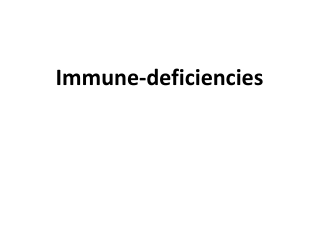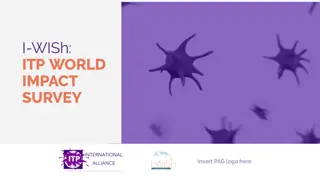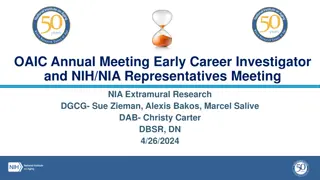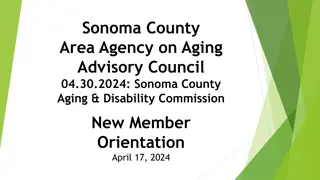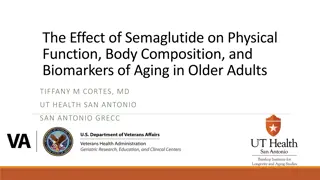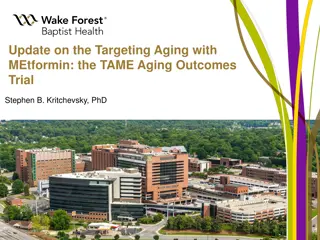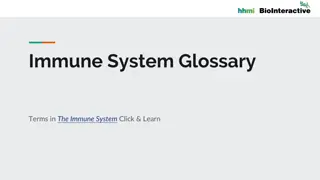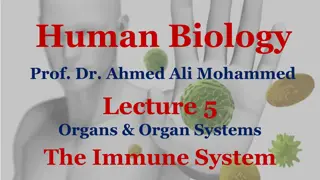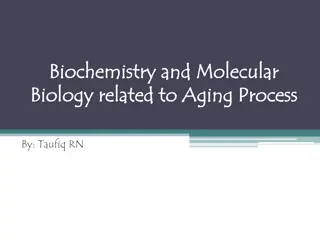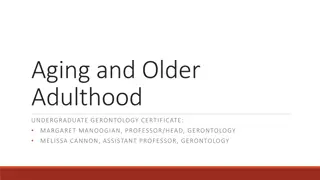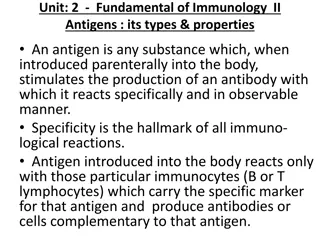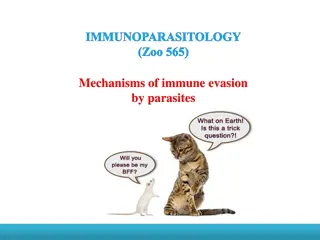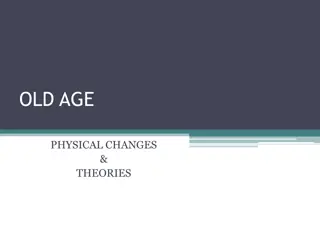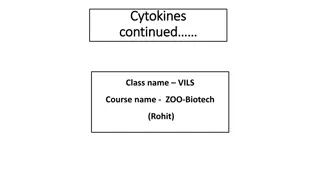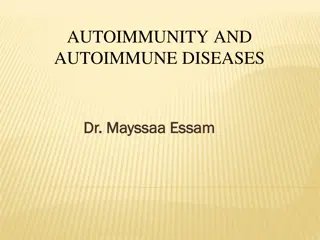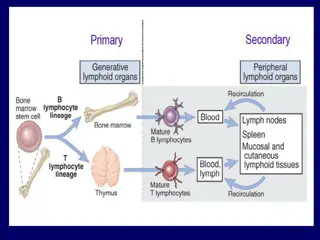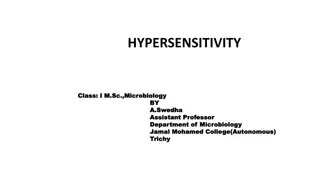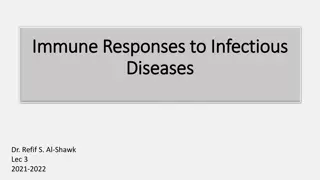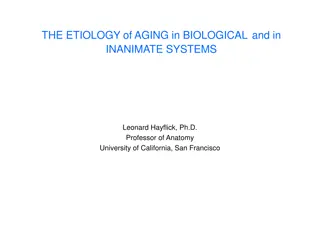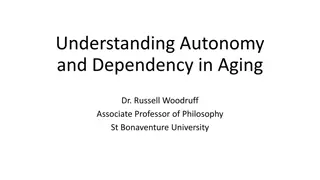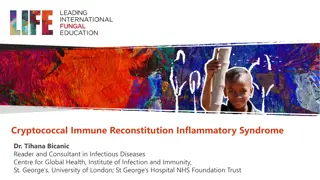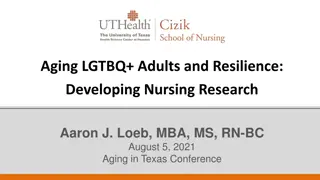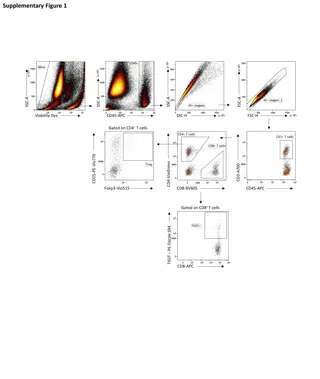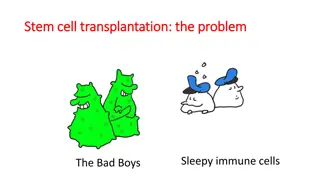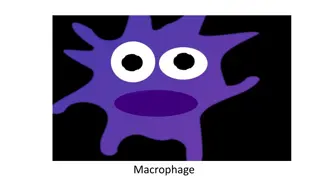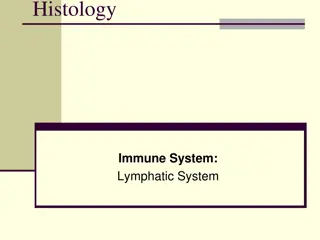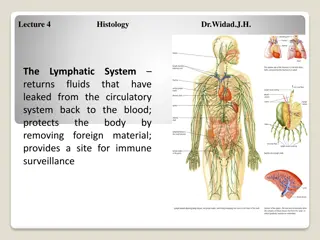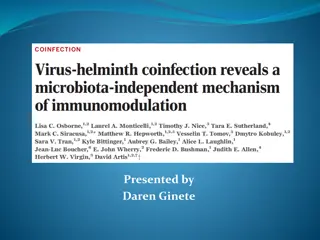Immune-deficiencies
Immune deficiencies can be classified into primary hereditary disorders based on clinical presentations, including cell-mediated, antibody-mediated, non-specific, and complement activation deficiencies. Major clinical manifestations of immune disorders range from B-cell deficiencies to phagocytic ce
2 views • 46 slides
Understanding the Aging Challenges Faced by Individuals with Autism
Aging individuals with Autism Spectrum Disorder (ASD) encounter various unique challenges such as communication difficulties, sensory issues, and social skills decline. Issues in aging, including caregiving, brain health, and mobility, are exacerbated for seniors with ASD. Addressing the needs of ol
0 views • 40 slides
Understanding Immune Thrombocytopenia (ITP) and Its Impact
Immune Thrombocytopenia (ITP) is a rare autoimmune disease where the immune system wrongly attacks platelets, leading to low platelet count. It can affect individuals of all ages, with symptoms appearing post-virus, vaccination, or certain medications. ITP can result in fatigue, bruising, and bleedi
3 views • 30 slides
Understanding the Aging Process: Causes, Effects, and Management
The aging process involves the gradual decline in tissue repair and maintenance of normal structure and function, impacting various systems in the body. Internal and external factors contribute to aging, leading to changes in physical, social, and psychological aspects. Recognizing the signs and sym
11 views • 23 slides
National Institute on Aging (NIA) Research Overview and Priorities
NIA conducts diverse research on aging processes, diseases, and conditions, aiming to improve the health and well-being of older adults. The institute focuses on genetic, biological, clinical, behavioral, and social aspects of aging, with priorities in aging physiology, cell biology, behavioral proc
0 views • 15 slides
Sonoma County Area Agency on Aging Advisory Council Meeting Highlights
Sonoma County Area Agency on Aging Advisory Council recently held a meeting welcoming new members and discussing important topics such as land acknowledgment, area plan approval, demographics, and the aging & disability network. The meeting also highlighted projections for the older adult population
0 views • 37 slides
Effect of Semaglutide on Aging Biomarkers in Older Adults
Semaglutide, a GLP-1 receptor agonist, shows promising effects on physical function, body composition, and aging biomarkers in older adults with diabetes. Studies suggest potential neuroprotective effects, improvement in skeletal muscle atrophy, and reduction in pro-inflammatory markers. Diabetes pr
0 views • 23 slides
Advancing Healthy Aging and Longevity Through Geroscience Research
Utilizing the geroscience paradigm, researchers explore targeting aging processes to extend healthspan and lifespan. The TAME Aging Outcomes Trial aims to test this hypothesis with metformin, a drug that shows promise in impacting aging-related pathways. By focusing on delaying the onset of multiple
1 views • 19 slides
Comprehensive Guide to Immune System Glossary Terms
Dive into the world of immune system glossary terms with definitions and visual aids. Explore key concepts such as immune cell activation, adaptive immune response, antibodies, antigens, and more. Understand the complex processes within the immune system through informative images and concise explan
1 views • 70 slides
Understanding the Immune System: Organs, Functions, and Importance
The immune system acts as a defense mechanism against pathogens and infections, comprising various organs, such as the bone marrow, thymus, spleen, white blood cells, antibodies, complement system, and the lymphatic system. It works to recognize and destroy harmful microbes, maintaining the body's h
1 views • 23 slides
Understanding Aging Process from a Biochemical Perspective
Biochemistry and Molecular Biology play crucial roles in understanding the aging process, focusing on the biochemical basis of life, the basis of health, major causes of diseases, and theories of aging. Aging is described as the accumulation of damage due to reactive oxygen species, with theories en
2 views • 11 slides
Undergraduate Certificate in Aging and Older Adulthood
This undergraduate certificate in Gerontology offers a comprehensive overview of aging, including courses on cognitive and physical changes, social ties, and elective topics such as Alzheimer's disease management and palliative care. The program aims to equip students with the necessary knowledge an
0 views • 4 slides
Understanding Antigens and Immunogens: Types and Properties
Antigens are substances that stimulate the production of antibodies in the body, exhibiting specificity in immune reactions. They interact with immune response products like antibodies, BCRs, and TCRs. Immunogens induce detectable immune responses, leading to antibody production or T cell activation
1 views • 30 slides
Mechanisms of Immune Evasion by Parasites in Immunoparasitology
Understanding how parasites evade the immune system of their hosts is crucial in the field of immunoparasitology. Parasites have developed various strategies such as anatomical seclusion, antigenic variation, and intracellular living to avoid host immune responses. Examples include Plasmodium within
0 views • 26 slides
Reflections on Aging and Mother-Daughter Relationships in Kamala Das' "My Mother at Sixty-Six
Kamala Das' poignant poem "My Mother at Sixty-Six" explores the stark reality of aging as the poetess confronts her mother's mortality during a car ride. Through vivid imagery and emotional depth, Das captures the nuances of the mother-daughter relationship, addressing themes of aging, fear, and acc
4 views • 8 slides
Understanding Physical Changes in Old Age and Relevant Theories
Late adulthood, typically starting around age 65, is a period where individuals confront the psychosocial task of integrity versus despair. Geropsychology plays a vital role in studying aging and providing clinical support. Erikson's ninth stage of psychosocial development suggests that older adults
1 views • 14 slides
Understanding the Significance of Cytokines in Immune Response
Cytokines play a crucial role in immune response activation and regulation. They are secreted by various cell types like lymphocytes, monocytes, and macrophages, exerting diverse biological functions, including immune system development, inflammatory response induction, and hematopoiesis regulation.
2 views • 12 slides
Understanding Autoimmunity and Autoimmune Disorders
Autoimmunity refers to the immune system's failure to recognize its own cells, leading to attacks on self-tissues. Autoimmune disorders encompass over 80 chronic illnesses where the immune system mistakenly targets organs. These disorders are poorly understood and recognized, impacting various organ
1 views • 20 slides
Immune Response Regulation and Autoimmunity Overview
The immune system maintains a balance through tolerance mechanisms to prevent autoimmunity. Central and peripheral tolerance play crucial roles in immune unresponsiveness to self-antigens. Failure in immune regulation can lead to autoimmune diseases like diabetes and lupus. Vaccination, discovered b
0 views • 18 slides
Understanding Hypersensitivity Reactions in Immunology
Hypersensitivity in immunology refers to an altered immune response against antigens, leading to hyperreactivity and immunopathology. This article delves into the different categories of adaptive hypersensitivities, focusing on Immediate (Type I), Antibody-Mediated Cytotoxic (Type II), and Immune Co
0 views • 6 slides
Exploration of Haitian Culture and Aging: Understanding Unique Perspectives
This research analysis delves into the cultural practices of Haitians, shedding light on how these practices shape their views on age and the aging process. From historical influences to values, rituals, dietary considerations, and medical care implications, this study aims to uncover the unique par
3 views • 10 slides
Understanding the Older Americans Act and Its Impact on Aging Services
The Older Americans Act (OAA) plays a vital role in providing programs and services to support older adults in aging-in-place. This act authorizes various initiatives such as meal assistance, caregiver support, health services, and more to enhance the well-being and independence of older individuals
1 views • 34 slides
Immune Responses to Parasitic Infections and Evasive Strategies by Protozoan and Helminth Parasites
Parasitic infections pose complex challenges to the immune system due to the diverse nature of parasites, including protozoans and helminths. Protozoan parasites move between arthropod vectors and mammalian hosts, requiring both humoral and cell-mediated immune responses. Meanwhile, helminths, as mu
0 views • 15 slides
Your Guide to the Best Prices Face Wash for Anti-Aging by Pnk Beauty
Looking for the best face wash to fight the signs of aging without breaking the bank? Pnk Beauty has curated a range of premium anti-aging face washes that offer the perfect blend of luxury and affordability. Infused with powerful ingredients, these
1 views • 7 slides
Unveiling the Etiology of Aging in Biological Systems
The etiology of aging in both biological and inanimate systems explores the concept that aging may not be driven by genetic programming but rather result from stochastic processes. The loss of molecular structure is a key feature of age-related changes. The Second Law of Thermodynamics is suggested
1 views • 38 slides
Understanding White Blood Cells and the Immune System
Explore the intricate details of white blood cells (WBCs), their types, functions, formation, and crucial role in defending the body against infections. Delve into the immune system, comprising barriers, cells, tissues, and organs that combat invaders, with a focus on innate and adaptive immunity. L
0 views • 65 slides
Understanding Anti-Inflammatory Foods and Immune Function
Our health is closely linked to the gut microbiome, with fiber playing a key role in feeding beneficial gut bacteria. Incorporating anti-inflammatory polyphenols from plant-based sources like fruits, vegetables, and herbs can promote a healthier gut. Additionally, fermented foods act as natural prob
1 views • 8 slides
Exploring Aging, Stress, and Longevity Factors
Delve into the complex nature of aging, from genetic influences to the impact of chronic and acute stress on health and lifespan. Learn about the interplay between biological processes, environmental factors, and personal resilience in the quest for understanding longevity. Explore the role of DNA,
5 views • 12 slides
Understanding Autonomy and Dependency in Aging
This content explores three conceptions of aging - chronological, biological, and psychosocial aging - and their impact on autonomy and dependency in older adults. It discusses how individuals age differently biologically and psychologically and examines the significance of interpreting and respondi
0 views • 20 slides
Understanding the Importance of the Immune System for Homeostasis
Explore the intricate workings of the immune system, from its component parts and defense mechanisms to the significance of homeostasis maintenance. Discover how non-specific and specific immune responses, phagocytosis, neutrophils, natural killer cells, and interferons play vital roles in protectin
0 views • 32 slides
Understanding Cryptococcal Immune Reconstitution Inflammatory Syndrome
Cryptococcal Immune Reconstitution Inflammatory Syndrome (C-IRIS) is a condition where rapid reversal of immunodeficiency triggers exaggerated inflammatory reactions in response to Cryptococcus antigens. It can manifest as either Unmasking IRIS or Paradoxical IRIS, with common CNS presentations incl
0 views • 10 slides
Understanding Immunotoxicity in Fish: An Alternative Model for Toxicological Studies
The study explores the immunotoxic effects of industrial effluents on fin fish, highlighting xenobiotics' impact on the immune system. It discusses the sensitivity of the immune system to environmental toxins and the elicitation of immune reactions by various substances. The importance of fish as a
0 views • 25 slides
Resilience Among Aging LGBTQ+ Adults: Nursing Research Insights
Exploring the intersection of resilience and healthcare access among aging LGBTQ+ adults is crucial due to the unique health disparities and challenges they face. This research delves into the social determinants of health, the significance of resilience, and perspectives from aging LGBTQ+ individua
1 views • 14 slides
Optimizing Immune System Through Holistic Approach
This PowerPoint presentation contains confidential information on optimizing the immune system to enhance overall health. It outlines a holistic approach involving neurological organization, meridian testing, and spectroscopic emission to support well-being. The content emphasizes the importance of
0 views • 27 slides
Immune Cell Analysis Supplementary Figures
This collection of supplementary figures provides detailed flow cytometry data on immune cell populations, including CD4+ T cells, CD8+ T cells, tumor-associated macrophages, and more. The figures also include information on immune checkpoint molecules like PD-L1 and TIGIT. Each figure presents spec
0 views • 4 slides
Understanding Stem Cell Transplantation: Removing Sleepy Immune Cells and Fighting "The Bad Boys
Stem cell transplantation involves addressing the issue of immune cells failing to recognize and eliminate tumor cells, known as "The Bad Boys." By removing the dormant immune cells and replacing them with new ones from a compatible donor, the therapy aims to empower the immune system to target and
0 views • 8 slides
Journey of Immune Cells in the Body
Explore the different stages of the immune response, starting with macrophages in the innate immune system that act fast without memory. Follow the path to the spleen and lymph nodes where T cells, already educated at birth to recognize specific antigens, await. Witness the intricate dance of the im
0 views • 18 slides
Understanding the Lymphatic System and Immune Response
The lymphatic system, a vital component of the immune system, consists of lymphocytes, plasma cells, and other cells within a framework of reticular cells and fibers. It includes lymphoid organs like the bone marrow, thymus, lymph nodes, and spleen. Diffuse lymphatic tissue and lymphatic nodules are
0 views • 20 slides
Overview of the Lymphatic System and Immune Response
The lymphatic system plays a crucial role in returning leaked fluids back to the blood, protecting the body from foreign materials, and supporting immune surveillance. It consists of lymphoid cells such as T and B lymphocytes, macrophages, dendritic cells, and reticular cells that work together to d
0 views • 31 slides
Understanding Helminths and Immunomodulation: A Comprehensive Study
Helminths, parasitic organisms affecting a large part of the global population, can modify the immune response through immunomodulation. This research delves into the interaction between helminths, microbiome, and immune response, exploring the effects on macrophages, alternative activation, and the
0 views • 28 slides
